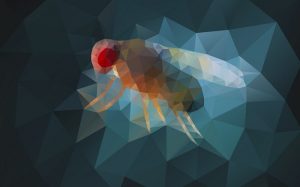Enter your address to receive notifications about new posts to your email.
Articles by Marisa Wexler (43 results)
-
The Sleep Inbred Panel: flies with extreme sleep patterns
A new collection of inbred flies provides a tool for studying genetic control of sleep. Sleep is vital for a healthy life, but some of us seem to get by with less snoozing than others. This individual variation isn’t unique to humans; fruit flies also show a variety of sleep patterns. These differences could potentially…
-
Nanopore sequencing of 15 Drosophila genomes
Low-cost sequencing closes gaps in fly genomes. Genetic sequencing technologies have revolutionized biological science, and regular advances in these tools continue to deliver better genomic data—more accurate and more useful—at a lower cost. In G3: Genes|Genomes|Genetics, Miller et al. report the genomes of 15 Drosophila species sequenced using Oxford Nanopore technology. Their work improves on…
-
Mitochondria on the mind
Mitochondria cell-autonomously regulate the secretion of neuropeptides in C. elegans. Neurons are hard-working cells that need a lot of energy to do their jobs, so it’s no surprise that they are highly dependent on their mitochondria to function properly. Yet these organelles do much more for cells than simply produce energy. In GENETICS, Zhao et…
-
The hole truth about activating Torso
Holes in the plasma membrane trigger the activation of the Torso receptor tyrosine kinase. As a general rule, cells don’t do well when holes are poked in their plasma membranes. That’s why many immune cells use enzymes like perforin to puncture the membranes of pathogenic cells, dysregulating and often killing them. However, a new report…
-
Peer-tutoring helps students succeed
Biology students who participated in a one-on-one homework activity with a classmate showed increased learning gains. The huge sizes of many undergraduate science courses make it rare for a student to get valuable one-on-one interaction with a professor. Teaching assistants and student tutors can help with this problem, but an expert may not actually be…
-
Midnight munchers: starved worms can’t sleep
Food-deprivation inhibits the stress-induced sleep response in C. elegans. For many animals, the essential physiological drives of sleep and food are intimately linked. You might have noticed this if you’ve ever stayed up far too late and found yourself craving a snack. Yet because it’s impossible for most animals to eat and sleep at the…
-
Drosophila development in the drink
A fruit fly model of fetal alcohol spectrum disorder reveals a Cyclin E-centric network modifies developmental sensitivity. Alcohol exposure in utero can lead to a wide range of developmental problems, even causing fetal death in some cases. But since this exposure doesn’t always have the same outcome, is it more likely to be a problem…
-
Navigating the maize of heritable epigenetic change
Tissue culture causes heritable methylation changes in plants. Tissue culture is a useful tool for plant scientists and horticulturalists in large part because it allows them to produce clones. Inconveniently, however, these clones are not always identical to the original, as one might expect them to be. In a report in GENETICS, Han et al.…
-
A new tool for longevity and mating studies in C. elegans
By borrowing a system found in plants, researchers can turn off sperm production in an inducible, reversible, and non-toxic manner Let’s say you want to study how your favorite gene affects aging. You pick Caenorhabditis elegans for your study because it is one of the most important models of aging, and you put some of…
-
Enhancing our view of enhancers
GC content alone is associated with distinct functional classes of human enhancers. Because enhancers can be located hundreds of kilobases away from their target genes, it can be challenging to accurately predict their functions. A new report in GENETICS uses sequence composition to distinguish two enhancer classes that have distinct functions and spatial organization in humans.…
-
Antibiotic resistance beyond the hospital
A strain of Staphylococcus epidermidis isolated from a hotel room may provide insight into how resistance develops outside of medical settings. Although intense research and media interest has focused on drug-resistant bacteria in hospital settings, resistance can and does evolve outside the clinic. Methicillin-resistant Staphylococcus epidermidis is often isolated from infections of medical devices, but…











